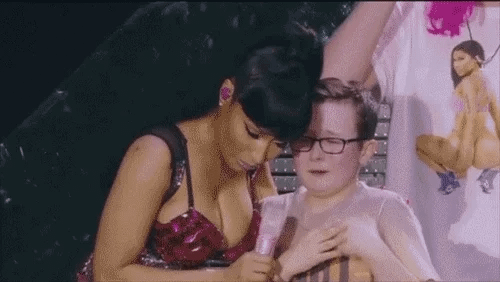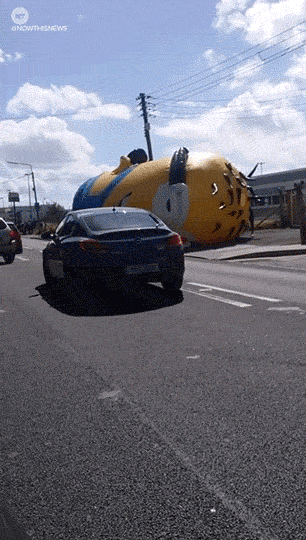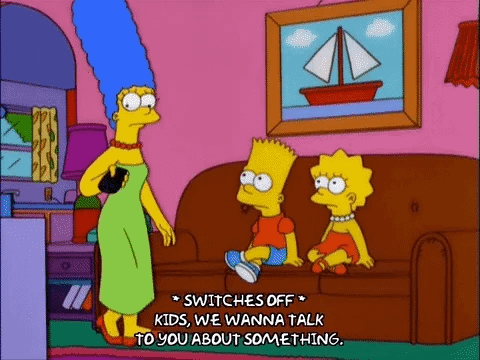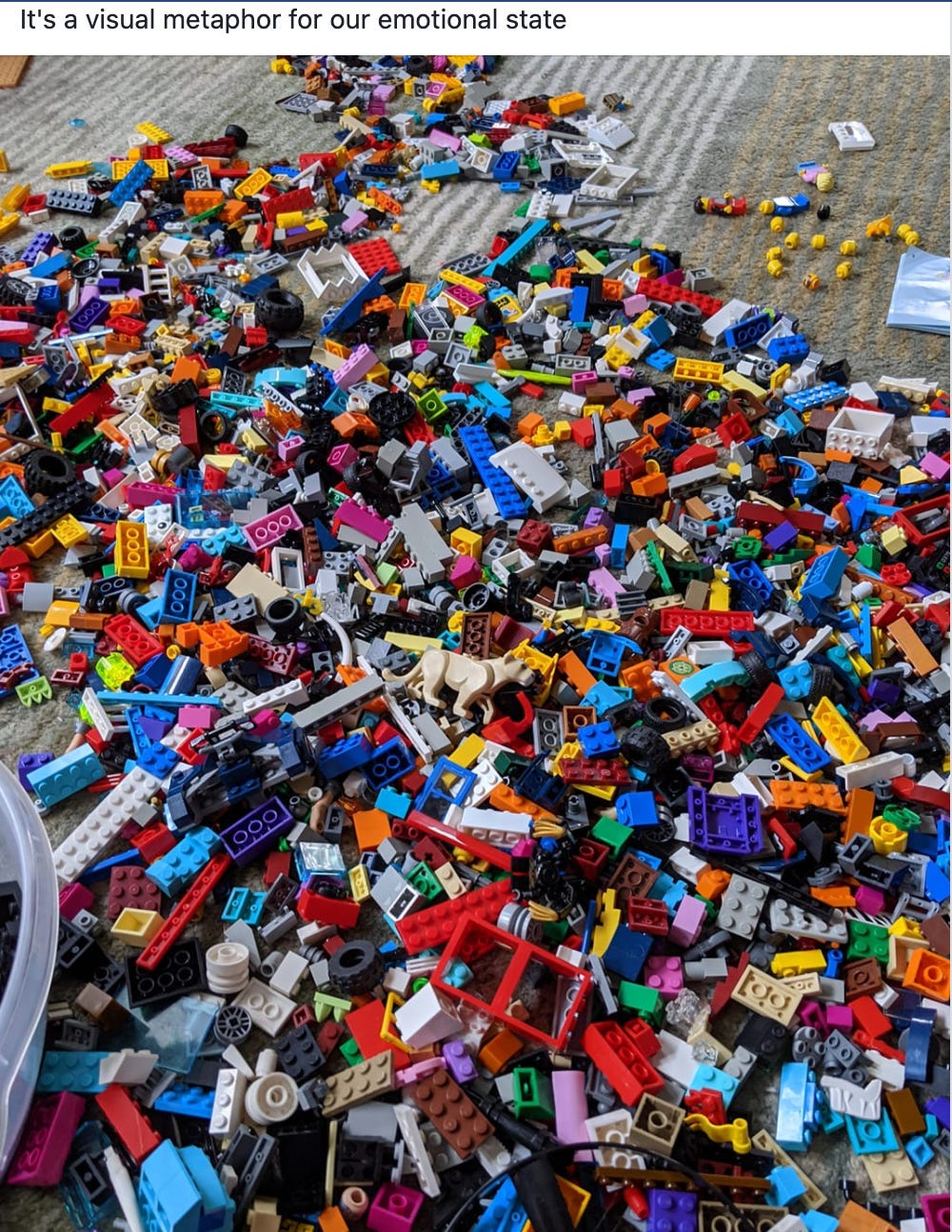Hi Evil Witches! I’m another Claire. My wife and I have a 4 year old daughter. I asked Claire if I could write this piece to share some tips about discussing death and serious illness with young children. In the age of coronavirus, I think it’s important that adults talk to children honestly about these topics. Death isn’t just for adults. I also believe it’s important to be prepared before these events happen, so you aren’t taken by surprise when you have to speak to your children about these topics.
When my daughter was newly two, my wife was diagnosed with Stage III breast cancer. We uprooted our lives and moved back to New York so my wife could receive care at Memorial Sloan Kettering. I pretty much spent the days plopping my daughter in front of the TV while I googled “breast cancer life expectancy” and then staying up all night scared shitless I was going to have to raise my daughter all alone. When my daughter was almost three, my wife’s mom died of cancer. At 3, my 84 year old dad died after a fall. At 4, another family member died of cancer after a short illness where I acted as her medical proxy. There was no getting out of explaining these events to my daughter. It was an apocalypse in her world.
I was a mess during my wife’s treatment. Chemo tired and sickened her to the point that she couldn’t do anything more than lay in bed watching The CW. I had to watch our daughter, take my wife to her treatments, go to work, and deal with getting settled after a cross country move. Every day was a flurry of to do lists and exhaustion. I barely kept my shit together, alternately breaking down in tears or snapping at my willful toddler. Although she was just two, she understood that something was very, very wrong in our family.
At first I tried to shield my daughter from the truth. It seemed too complicated to explain and too scary. As treatment went on, she asked questions about why Maddy (what she calls my wife) wasn’t around or why we had to leave the house on weekends to let her rest. Thankfully I discovered a family support group with a child psychologist soon after my wife began treatment. The psychologist advised me to be honest in an age appropriate way. It was the best advice I ever received, and I think why my daughter got through these events whole on the other side.
In the pre-Corona times, most parents I know did not have to deal with talking to their young children about death. Unfortunately this is a skill I’ve had to learn all too well. Most of the resources out there are for tweens and teens, and there is very little available to those of us with young kids. I think there is a natural desire to shield your kids from as much of the bleak reality as possible. In my experience, this leads to more questions than answers and a lot of anxiety, so a direct and honest approach works best.
On the other hand, my child’s acquaintance with these topics have actually been a really awkward part of parenting for me socially, as my daughter had questions that other parents haven’t had to deal with much. “Yes, she’s potty trained, but she’s worried I’m going to die, have you guys dealt with that with your kids?” (They hadn’t.) It can be lonely to deal with these issues, and having your kids shielded makes it worse. When your kids see you breaking down, they are learning how to express emotions and allow their feelings to be present. It allows your family to grieve together over the loss of your old life and gives you the strength to accept the new reality.
My daughter had a lot of questions before I came clean. She would ask why Maddy couldn’t play with her, or why she had to have surgery. She once famously asked my wife “Where’d boobs go?” By the time I explained to her what cancer was, she was relieved to hear an explanation and wasn’t upset. It did lead to more questions, but all ones I could handle. In general it is pretty common for younger kids to absorb the information and move on, and ask more questions over the coming days.
When my mother in law went into hospice, I had to explain death to my daughter. A friend whose mother had also passed away from cancer had gifted me Lifetimes, a book about death and the cycles of life for children. I can recall tearfully reading this to my daughter the day after my mother in law went to hospice. It was a helpful framework for how to talk about this part of life. I explained that when people are old or very very sick, they die, but you can still remember them and see them in your dreams. For days after she asked me if her other grandparents would die soon, or if Maddy would die because she was sick. We worked through her fears and discussed each question as it came up. Later that week we flew to California to say goodbye to her Grandma. Although she was mostly out of it, she was aware my daughter was there and they shared some sweet final moments together. My daughter was completely untroubled by the experience, and remembers it fondly. My mother in law, who had barely spoken in two days, came to enough to say “I am released” from seeing her granddaughter. It gave them both the closure that we all crave when we lose someone, and wasn’t scary for my daughter because she understood what was happening and why.
The best thing to do is prepare your child well before death touches your life. When speaking about death and illness, be honest and avoid euphemisms. Make sure they understand that most people can recover from illness, but that death is a natural part of life. I would suggest several conversations with your child over many days so they understand and can ask questions after they’ve processed the information. Prepare your child for what they may see or hear from their ill family members or at a funeral. Be honest with your child about how you are feeling so they can share their grief with you too, but don’t be surprised if they seem to take things in stride. I noticed my daughter often had her follow up questions many days or weeks later as it sunk in that those that had died were really gone. Overall, the most important thing is to be honest.
I hope that helps and that you never have to deal with this. If you’re dealing with this and overwhelmed, feel free to reach out to me anytime @halfwrittensong. Hang in there, witches.

Resources:
The Do's and Don'ts of Talking with a Child about Death Psychology Today
Terrible, Thanks for Asking podcast
Claire Lovell does tech by day and writes by night. She lives in Westchester, NY with her wife and daughter after a decade-long stint in Northern California. Her work has appeared in The Billfold, The Startup, and other publications. You can learn more about her at clairelovell.com or find her on Twitter at @halfwrittensong.
End credits
I hope you enjoyed this issue of Evil Witches, a newsletter for people who happen to be mothers. If you think you’d like something like this in your mailbox once or twice a week, please subscribe, and become a paid subscriber to get some extra content and support the work.
If you’re interested in writing a guest post like this, have any general questions or have a suggested topic you can reply right to this newsletter. You can also follow us on Instagram and cc: us on good Tweets like this:

One witchy thing





